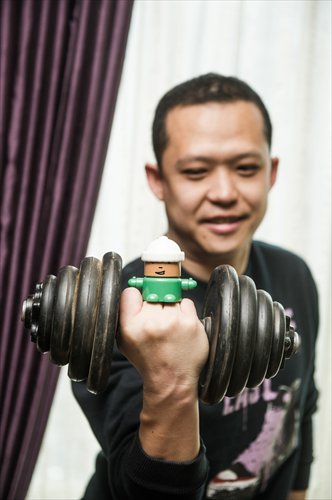A man’s work
How fathers-to-be can get their sperm in tip-top shape to try for a baby

Experts say it is important for prospective fathers to pay special attention to their health before trying for a baby. Photo: Li Hao/GT
Wang Ling has been forced by his wife to abandon smoking, drinking alcohol and indulging in his spicy, barbequed foods in anticipation of trying for a baby in 2016.
"It's like I'm the one who is to give birth," joked the 29-year-old Beijing bank employee. "Isn't it a woman's role to prepare for pregnancy? After all, it's her womb that it'll be growing up in!"
However, Guo Jun, director of the andrology at Xiyuan Hospital under the China Academy of Traditional Chinese Medicine, said Wang's wife is right to ask her husband to take precautions.
"It's important that a man also makes preparations prior to trying for a baby, with the main goal being to increase sperm count and quality," he said. "The pollution and increasingly unhealthy lifestyles of men these days can have a detrimental effect on their sperm, which may affect their baby's future health."
Guo's claims are supported by recent studies in Western medicine. In one such study, data from 94,000 patients in more than 30 countries was analyzed by researchers from the University of Otago in New Zealand. The researchers found that poor sperm quality at the time of conception may be linked to a high risk of the baby developing conditions such as autism and Down syndrome.
"It is well-recognized that reduced sperm performance can affect pregnancy success, but it is less well known that the quality of the sperm, particularly DNA quality, could affect the development and health of offspring," said the study's lead author, Sheri Johnson, to MSN News.
Another study, conducted by researchers from the University of Melbourne and the Murdoch Children's Institute suggested a link between a father's smoking habits prior to conception and the risk of the child developing asthma.
According to a report released by China's National Health and Family Planning Commission, sperm quality of men in China decreased more than 40 percent between 1981 and 1996, due to changing lifestyles brought about by the country's modernization. The report pointed out that on average, sperm quality in more urbanized areas was worse.

Fathers-to-be should monitor their diets and regularly exercise to improve their sperm quality. Photo: Li Hao/GT
Changing bad habits
For prospective fathers who smoke, Guo said the first thing that needed to be done to improve sperm quality was to kick the habit.
"A man should quit smoking at least three months before trying to conceive," said Guo. "It is equally important that he avoids second-hand smoke."
Secondly, Guo advised fathers-to-be to refrain from drinking alcohol.
A study led by professor Tina Kold Jensen of the University of Southern Denmark, published in the journal BMJ Open last October, found that drinking just five units of alcohol per week could diminish a man's sperm quality.
The more one drinks, the worse it is: Those who typically drink 40 units a week, the study found, have a 33 percent lower sperm count and 51 percent fewer "normal looking sperm" compared to men who drink five units or fewer per week.
Men should also keep their body weight within a healthy threshold, said Guo.
A research group at the University of Aberdeen looking at 5,000 Scottish men found that those with a Body Mass Index (BMI) between 20 and 25 tended to have higher sperm quality than those with a BMI above 26, which is considered to be overweight. Those with a BMI above 30, which indicates obesity, were found to have a higher number of abnormal sperm than those falling within a healthy weight threshold.
Related to body weight, Guo suggested that men should prevent themselves from staying sedentary, which is a common risk for those who work in offices.
"A man who is preparing to try for a baby should do no less than two hours of aerobic exercise each week," Guo said. He also warned men against sitting cross-legged, which can increase temperature in the testes, harming sperm quality.
For the same reason, Guo said, men hoping to be fathers should also desist from wearing underwear or trousers that are too tight, and avoid going to saunas or bath houses where the temperature of the water is too hot.
In comments to The Telegraph, Marc Goldstein, director of the Center for Male Reproductive Medicine at New York Hospital's Cornell Medical Center, said Japanese men traditionally used hot baths as a form of contraception.
Finally, men planning to try for a child are advised to restrict the use of their cell phones.
According to the findings of a 2008 study carried out by researchers from the Cleveland Clinic of the Center for Reproductive Medicine in the US and published in the journal Fertility and Sterility, electromagnetic waves emitted from cell phones can negatively affect sperm quality and impair male fertility.
Researchers found that the longer a man spent on his phone each day, the lower his sperm count and sperm activity.
Improving nutrition
Shi Jie, a nutritionist based in Beijing, said that poor diet could also affect sperm quality.
"It's equally important for men and women to pay attention to their nutritional intake when preparing to have a baby," said Shi. "For men, it is beneficial to increase intake of protein and arginine."
According to Shi, lean meat, egg, fish, shrimp and beans are all high protein foods suitable for a man who is preparing for pregnancy. To increase levels of arginine, an amino acid, Shi recommended eating eel and sea cucumber.
Sperm quality was also affected by vitamin and mineral intake, said Shi.
Vitamin A and E are important to the normal functioning of a man's sexual glands, and can help increase sperm count and sperm activity, said Shi, while zinc and selenium also played an important role in producing healthy sperm.
"Men who wish to improve their sperm quality should eat plenty of animal liver, vegetable oil, green vegetables and fresh fruits," said Shi. "I would advise men to eat at least eight different kinds of fruits and vegetables each day, amounting to a total intake of no less than 300 grams."
Shi also suggested that men increase their intake of folic acid. Low levels of folic acid are associated with higher rates of abnormal chromosomes in sperm, leading to a higher risk of miscarriage and birth defects.
Folic acid is found in beans, green vegetables, grains and citrus fruits.
Finally, Shi said that men should be aware that any medications they are taking could affect sperm quality, including antihistamines, caffeine, morphine, steroids and anti-impotence drugs.
"When a couple is trying to conceive, both the man and the woman should be very careful about what medications they take," said Shi. "If necessary, they should go to a doctor for advice."
Don't wait too long
According to Guo, the optimal age for sperm quality is when a man is between the ages of 30 and 35. It is between these ages that a man is generally in his physical prime, said Guo.
The University of Otago study found that a man's age affected both sperm count and sperm quality, with men who are older generally showing a greater number of malformed sperm, and sperm with damaged DNA.
Guo said however this was no reason for men over the age of 35 to panic.
"Although testicular function declines year by year as men get older, the rate of this decline is different for each individual," said Guo. "It depends on their lifestyle habits, such as whether they smoke or not, whether they drink, their diet, and how much physical exercise they do."
Shi agreed with Guo, but said men who were over 35 should be extra cautious.
"If a man over 35 is trying for a child…they need to be twice as careful as a younger man," said Shi.